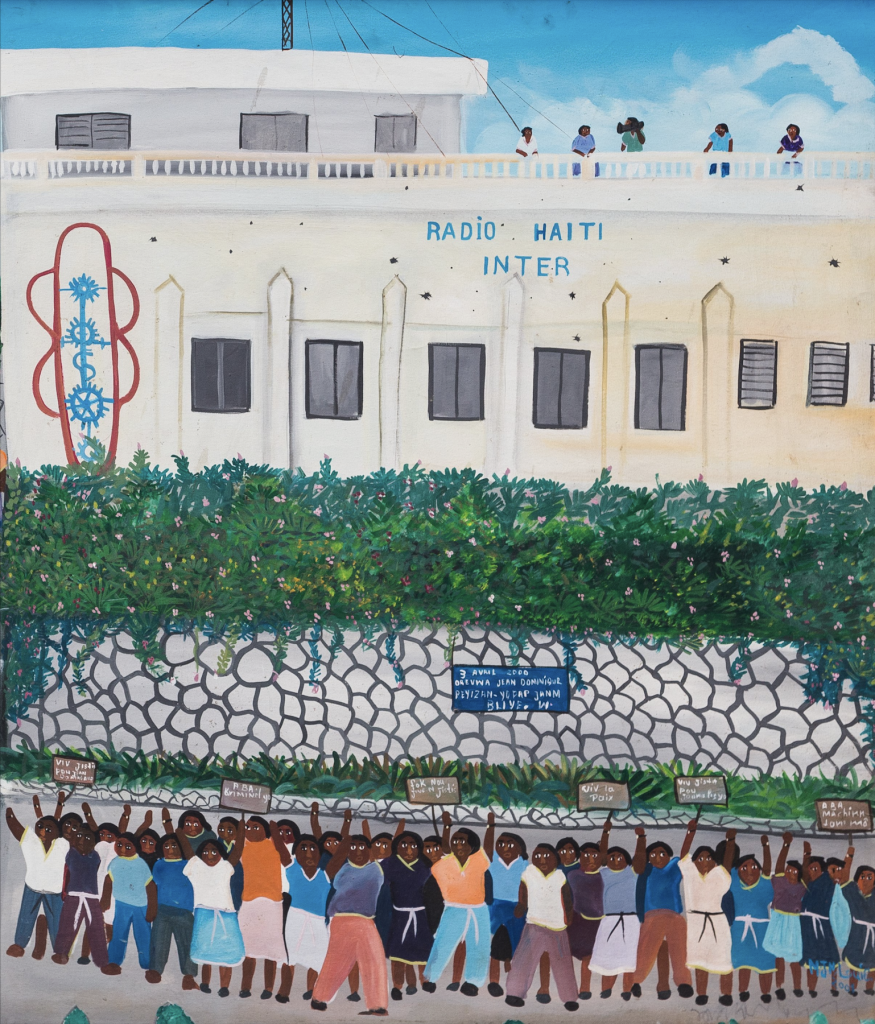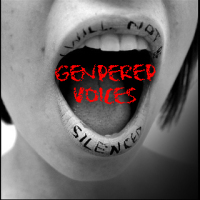Broadcast Kidnapping: How the Rise of the Radio led to the Fall of Jean-Claude Duvalier


Radyo Ayisyen
Learning from other scholars’ work on Haitian radio was, and still is, one of the greatest pleasures in the process of writing Isles of Noise: Sonic Media in the Caribbean (UNC 2016). People living in or from Haiti widely acknowledged and almost took for granted radio’s outsized role in public and political life. Edwidge Danticat and Jonathan Demme also understood this and paid tribute in Claire of the Sea Light and The Agronomist respectively, but historians remained largely fixated, understandably, on pivotal moments in Haiti’s rich history. Radio is different. Not pivotal, but witnessing the pivotal. Less dramatic and more long lasting and adhering to the same format for days, years, decades. It speaks to people who wouldn’t read newspapers or books. It floods private and public space with the sounds of music, talking, ruling, dissenting, explaining, satirizing, creating, crying, testifying, lying. But it leaves few archival traces. This is why the work of the five scholars in this series is so important. They allow us to hear a little and honor the listeners who make the medium what it is.
Last week, Ian Coss gave a finely tuned account of a “day in the life” of a radio station in Cap Haïtien that follows the programming rhythm of days and nights. This week, Jennifer Garcon shows how the long marriage between Haitian politics and Haitian radio has endured, despite multiple and conflicting alliances, high drama, and attacks from all sides. The powerful and the powerless have even in their enmity presumed that if they could harness radio’s power they would ascend to political power. Her story recounts one of the pivotal points in the relationship—its near breakdown and ultimate survival—also a turning point for a 19-year-old Jean Claude Duvalier, newly proclaimed President for life. Guest Editor– Alejandra Bronfman
Click here for the full series!
—-
On January 23, 1973, Jean-Claude Duvalier, only 18 months into his life-long appointment, received a call that threatened to profoundly destabilize his nascent presidency. On the other end was Clinton E. Knox, a close political ally and advisor, who also happened to be the US Ambassador to Haiti. Knox, Jean-Claude was informed, along with US consul general Ward Christensen were being held hostage at a residence just outside of Port-au-Prince. To secure the safe return of two high-ranking US officials, the captors demanded the release of political prisoners, a hefty ransom, and a plane to facilitate their escape. The kidnappers “meant business,” reported The Washington Post, Times Herald on Jan 26, 1973, and during the call, Knox warned Jean-Claude of the severity of the situation, that they ”threatened to blow my head off, if they didn’t get what they wanted.”

Just hours before, Knox, boasting of Haiti’s improved political situation, told a Miami Herald reporter that, “everything [was] calm.” Since Francois Duvalier’s death in 1971, the new president had been aggressively courting international aid. In a marked departure from his father’s political rhetoric, Jean-Claude openly declared his intention to lessen authoritarian conditions in Haiti. He called for the organization of new political parties and the reestablishment of a “freer” press. Thanks to Knox, millions in international and humanitarian aid–previously suspended because of Francois’s long history of human rights abuses– began pouring into the country. In truth, Jean-Claude never intended to fully democratize Haitian society, he instead hoped that a few small concessions would help him to secure the benefits of appearing to do so. But soon, his new “liberal policies” allowed for the public expression of widespread discontent and opposition that had long festered just beneath the surface.
Since Francois Duvalier’s 1957 election, Haiti’s government had systematically and strategically cut off avenues of civic participation in political life. During his 14-year rule, Francois co-opted any existing institutions that could oppose his consolidation of power, including the church, the army, and the press. This was a stark contrast to the political campaign season that led to his election, wherein aspiring political figures frequently made impassioned radio speeches in the hopes of courting new supporters. Over the airwaves, presidential hopeful Daniel Fignole sometimes summoned his woulo konmpresè, a popular force of over 10,000 supporters to the street in protest. Duvalier shaped his Noirist ideology in part via public discourse over the airwaves. However, after taking power, he closed off these avenues of political engagement. By limiting the flow of information, the regime fostered social alienation and mistrust amongst different sectors of the population.
The vibrant political debates that characterized the 1940s and 1950s Haitian media were replaced with round-the-clock pro-government propaganda. Nearly all independent radio stations and newspapers were shuttered, leaving only pro-Duvalier stations, like La Voix de la Révolution Duvalieriste, and papers like newspapers Le Nouveau Monde and Panorama. When, in 1971, a gravely ill Francois announced the transfer of the presidency to his politically inexperienced 19-year-old son, Jean-Claude, there were no national outlets for citizens to register their resistance. However, many anticipated that the death of Papa Doc would create a political vacuum too large for his son to fill. This possibility inspired new anti-government efforts.

At 4 pm on January 23, as he was leaving his office in Port-au-Prince, Ambassador Knox was accosted and forced into an unmarked sedan. He was driven to his home just outside the city. The kidnappers, brandishing a small arsenal, demanded an audience with the young president. Instead, and in a breach of protocol, Knox contacted the consul general and lured him to the residence, where he too was taken hostage. Two hours later, Jean-Claude Duvalier received the distressing call.
The young president found himself in a dire situation, given his long-regarded political disinterest. Both critics and supporters of the Duvalier regime believed he would be too weak and ineffectual to hold power. Up until then, Duvalier’s reliance on loyal old guard Duvalierists and his close relationship with Knox had sustained his presidency. Encouraged by the prospect of millions in international aid, Jean-Claude began distancing himself from the violence of his father’s regime. Jean-Claudisme would tolerate criticism, promote free speech, embrace dissent and welcome repatriating exiles. As Knox frequently argued, Jean-Claude had “embarked on a course diametrically opposed to the one [Francois Duvalier] pursued.”
The 1973 kidnapping would be the first public reckoning for the new regime; the first open challenge to Jean-Claude’s political legitimacy. The kidnappers, anti-government leftists, demanded the immediate release of 31 political prisoners, safe passage out of the country, and $100,000 ransom. A final demand would not materialize until the early morning on January 24. After hours of negotiations with Duvalier’s administration, the kidnappers tacked on one last demand; that the details of the kidnappers be shared with Haitian citizens via a national radio broadcast. In defiance of the advice of his father’s most trusted advisers, and to save Knox’s life, Jean-Claude acquiesced.
At approximately 10am on January 24, French Ambassador Bernard Dorin interrupted existing radio programming with a special announcement: Ambassador Clinton Knox had been kidnapped and held captive by three anti-government rebels. To secure his release the Haitian government had agreed to release 12 political prisoners, pay $70,000 US dollars in ransom, and charter an aircraft to transport the kidnappers and released prisoners to exile in Mexico.
By conceding, Jean-Claude acted outside of the existing political framework set in place by his father. The Haitian public had come to expect consistency in political culture; any and all opposition was to be immediately crushed. That morning the airwaves carried the news of the dictatorship’s fragility to listeners far and wide. On the heels of the unprecedented announcement, Radio Haïti-Inter began reporting on the kidnapping developments to audiences around the nation. When Jean L. Dominique, a former agronomist, went on-air, it was the first time since 1957 that domestic news was transmitted without censorship. Listeners were now given unfettered access. Dominique and co-anchor Marcus Garcia were the first reporters to arrive at the Knox’s residence, while he, Ward, and the kidnappers were still inside. Radio Haiti journalists described the surreal scene in detail, and conducted interviews with newly released political prisoners. When Knox finally emerged, listeners were privy to his fragile state, he appeared intoxicated and was clutching a bottle of rum; a stark contrast to his strongman image. When the kidnappers safely boarded an Air-Haiti plane bound for Mexico City, where they were promised (and granted) asylum, Dominique reported from the runway. For the listening public, the scene was simply remarkable.

The broadcast would undoubtedly be the most politically consequential of the kidnappers’ demands. It would mean that, for the first time of Jean-Claude’s young presidency, and for the first time in decades, news of the dictatorship’s fragility and fallibility would reach the entire Haitian populace. Almost immediately, one journalist noted a change in the country, noting in “Haiti: Trouble Ahead in Latin America in February 1973 that, when Jean-Claude conceded to the kidnapper’s demands, “Haitians finally realized that Papa Doc was gone forever” (Special Collection and University Archives, Rutgers University, Robert J. Alexander Papers, [MC974.1 Box 3]).
Citizens awoke to find themselves now living in a Haiti where anti-government resistance could succeed. In Isle of Noise: Sonic Media in the Caribbean, Alejandra Bronfman argues that, “as listeners understood themselves to be listening along with others,” new possibilities for social and political life were revealed. For Haitian citizens living under the yoke of an authoritarian government, radio listening became a way to engage in politics and reclaim political agency in defiance of government overreach and repression. Widely accessible radio receivers could bridge areas otherwise geographically disconnected from urban, and often political, centers. Moreover, uncensored kidnapping coverage transformed Haiti’s political arena by radically changing popular ideas of what kinds of resistance were possible.

In the aftermath of the kidnapping, Jean-Claude moved quickly to plug the political vacuum that has emerged in the wake of the kidnapping. He was determined to change popular memory of the event. Haitian newspapers began to praise Duvalier’s political acumen in saving the life of two US officials. A mass rally was organized two days later to celebrate the President’s achievement. There, Jean-Claude gave his first ever public speech entirely in Haitian Kreyòl. “Little Duvalier,” he said, “would never hesitate to crush two or three vagabonds if he wanted to.” Addressing any would-be imitators, he warned, “I will be waiting for them with a big coco macaque.”
As the government tried to hold onto power, new journalists and broadcasters were increasingly singled out by the administration. In 1980, a press crackdown led to the arrest of over 100 independent print and radio journalists. Despite government repression, radio broadcasting has been credited with the eventual ouster of Jean-Claude in 1986. The Knox Kidnapping was an early moment that signaled the possibility of a political alternative to Duvalierism. Even Knox agreed. Years later, he’d describe the ordeal as “one the most amazing things to happen in [Haiti] [“Envoy Relates Haitian Rebel Death Threats.” The Washington Post, Times Herald, Jan 26, 1973].
—
Featured Image: Jean Dominique and Michèle Montas return to Haiti in from exile in 1986 after the fall of Jean-Claude Duvalier, met by 60,000 plus people. Radio Haiti Collection, David M. Rubenstein Rare Book & Manuscript Library, Duke University CC BY-NC-SA 4.0
—
Jennifer Garcon is the Digital Scholarship Librarian at the University of Pennsylvania Libraries’ Center for Research Data and Digital Scholarship. Garcon instructs on the use of digital tools, methods, and literacies via tutorials and one-on-one consultations and provides project management and infrastructural support that helps faculty, students, and staff build innovative and sustainable digital projects. She collaborates closely with Penn and Philadelphia-area partners to develop and expand sustainable models for the care of vulnerable collections of data. Garcon received her Ph.D. in History from the University of Miami, an MA in English and American Literatures from Hunter College, a BA in English Literature and Cultures from Brown University. Her academic research interests include radio broadcasting, populist political rhetoric, and grassroots social movement in the Cold War Caribbean. Since 2016, she’s been a research associate with the Library of Congress’s Radio Preservation Task Force.
—

REWIND! . . .If you liked this post, you may also dig:
Radio de Acción: Violent Circuits, Contentious Voices: Caribbean Radio Histories–Alejandra Bronfman
Kawa: Rediscovering Indigeneity in China via Reggae–Junting Huang
SO! Reads: Tsitsi Jaji’s Africa in Stereo: Modernism, Music, and Pan-African Solidarity–Celeste Day Moore
























Recent Comments